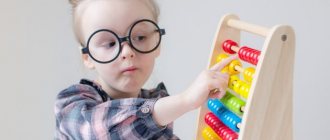Diagnostics
In modern kindergartens, classes are conducted according to the education and training program, which was approved by the Ministry of Education for the coming years. That is, all classes in the kindergarten are structured and conducted based on the requirements for the level of knowledge by age categories of children. Let’s say, by the age of three, children should know colors and understand what “more” and “less” are, and by six they should be able to count to 20, solve simple addition and subtraction examples, and have a good understanding of how a vowel sound differs from a consonant – This is the level required to enter school.
The tasks of a psychologist in kindergarten
Considering all of the above, we can summarize the tasks of a child psychologist in a preschool setting:
- using diagnostic psychological methods to identify the causes of developmental disorders in children;
- develop individual or group correctional and developmental programs;
- take measures to prevent negative consequences in case of low competence of staff or characteristics of the health status of children;
- carry out work with children of an adaptation nature to the conditions of preschool educational institutions;
conclusions
A child psychologist is a specialist who helps children and their parents harmonize relationships, overcome life’s difficulties and adversities, and normalize the child’s behavior and emotional state. A psychologist works only with healthy children and their families, so we are never talking about making diagnoses or prescribing medications, only psychiatrists and neurologists do this.
Difficulties happen in the life of any family, and sessions with a psychologist allow you to overcome them faster and more effectively. The principles of providing psychological assistance make such activities safe: specialists always monitor the confidentiality of data, use only proven work methods, are always on the client’s side and never work outside their area of competence. In addition, the psychologist never insists on the only correct decision and, moreover, does not condemn family members.
Psychological organizational methodological work
A practical psychologist in a kindergarten is a specialist who constantly gets acquainted with new trends in his field and constantly masters new techniques. In this he is helped by psychology centers and methodological associations, which are regularly held with all employees of the district or city, where topical issues are raised. Optionally, psychologists from kindergartens and schools undergo additional training at trainings and seminars, mastering innovative methods of working with children, parents and teaching staff.
Consultation for teachers:
“Psychological comfort of a child in kindergarten”
Kindergarten is a special place in the lives of most of us. This is a warm and cozy home in which each child is accepted and understood as he is, developing him in the future as an individual. One of the most important areas in the work of teachers is creating a comfortable psychological climate for children. It is very important in what mood the child will cross the threshold of kindergarten. I would like to see every child going to kindergarten happy and not burdened with worries beyond their age.
Currently, scientists in the field of pedagogy and psychology talk and write about the humanization of education, about an individual approach to children in the process of training and education, about attention to each child, about creating an atmosphere of psychological comfort in kindergarten. Psychological comfort for a child in kindergarten is determined by the convenience of a developing space and a positive emotional background, the absence of tension in the mental and physiological functions of the body. The general atmosphere and mood of the group are determined, despite the individual characteristics of the children, by the adults.
It is known that as soon as you cross the threshold of a group, you can feel the atmosphere of relaxedness or closedness, calm concentration or anxious tension, sincere fun or gloomy wariness that is present in the group.
The atmosphere in a kindergarten group is determined by:
1) The relationship between the teacher and children;
2) Relationships between the children themselves;
3) Relationships between educators;
4) The relationship between educators and parents.
A good climate in a group occurs when all its members feel free, remain themselves, but at the same time respect the right of others to be themselves. The teacher has a very significant influence on the quality of the group climate. In fact, it is the teacher (and not the children, as we usually think) who creates a certain climate in the group.
The first step that an educator interested in creating a favorable atmosphere in a group must take is to create and analyze the group situation.
We can highlight the criteria that make up the psychological comfort of a child in a preschool educational institution.
1. Calm emotional environment in the family.
Emotional stability and the absence of psychological stress in a child in the family have a great influence on psychological comfort in a preschool educational institution. Confidence in the love, respect and understanding of loved ones sets the child up for open, friendly relationships with teachers and peers in kindergarten. The teacher’s task is to study the psychological situation in the family through questioning and monitoring; as well as taking into account the individual characteristics of each family.
2. Daily routine
It is important for a preschooler to have a stable routine. A child who is accustomed to a certain order is more balanced. He imagines the sequence of classes, the change of activities during the day and tunes in to them in advance. An atmosphere of calm life, lack of haste, reasonable balance of plans of adults are necessary conditions for the normal life and development of children. During the day, neither the teacher nor the children should feel tension from the fact that they do not have time to do something and are in a hurry to get somewhere. The main components of the FGT regime are food, sleep and walking for at least 2 hours; other points may vary depending on age and program tasks.
When going to bed, children need affection, attention and care. Awakening should occur in a calm environment, without haste. It is mandatory that a teacher or assistant teacher be in the group during sleep.
Walking is the main condition for children's health. Conducting classes indoors by reducing walking time is strictly prohibited. The walk must be carried out in accordance with the requirements of FGT and maintaining all parts and activity of the teacher.
Children should have free access to clean drinking water and a toilet at all times.
3. Ensuring the comfort of the subject-development environment: compliance with the age and current characteristics of the group; availability of toys, non-irritating color scheme of the interior, presence of plants with aroma that helps relieve stress (cinnamon, vanilla, mint), etc.;
4. The teacher’s behavior style.
Staying in a group of 20–25 peers for the whole day is a big burden on the child’s nervous system. How to create a calm environment? First of all, the teacher himself must be calm and friendly. An even demeanor with children is required. The teacher needs to monitor his psychological state to prevent aggressive outbursts and apathetic fatigue. Inadmissibility of psychological pressure on children and rudeness with them. Monitor the noise level in the group: children’s voices that are too loud and harsh intonations create a negative background for any activity.
There are a few simple general rules that will help you establish good relationships with children and earn their trust and gratitude:
use endearments and names more often in your speech;
sing with and for children;
appreciate the moments when together you can experience the joy of something you saw or heard;
strive to provide children with a variety of interesting experiences;
make sure they are never bored and keep busy with something;
encourage children’s desire and attempts to do something without judging the results of their efforts;
maintain the inner conviction that every child is smart and good in his own way;
instill in children faith in their strengths, abilities and best spiritual qualities;
Find personal contact and an individual communication style with each child.
create positive traditions of group life.
A teacher’s ability to create situations of success for each child has a huge impact on the child’s emotional state and the formation of his personality. This is facilitated by the inclusion of the child in holidays and performances. Even the most insignificant role gives the child confidence in his own importance and increases self-esteem. A child’s trust in adults and personal stability are violated if the child is “left out” of a group public performance. This is the most important condition for a child’s trust in adults in kindergarten and a feeling of general psychological comfort.
5.Good traditions
A necessary condition for mental well-being is the child’s confidence that the teacher treats him as fairly and kindly as everyone else, that he is considered as valuable and necessary a member of the group as other children. In everyday life, situations constantly arise when someone is given more comments, someone is praised more often, etc. This can make children feel that they are not treated equally by the teacher. In order to convey to each child that he is valued equally with everyone else, it is advisable to introduce some traditions into the life of the group and strictly adhere to firm principles in his own behavior.
A wonderful tradition to celebrate children's birthdays. It is necessary to prepare a single scenario that will be equally reproduced when honoring each birthday person (a traditional round dance game - for example, “Loaf”; learn great songs for a boy and a girl with children).
You can introduce another custom - “Circle of Good Memories.” This is a mental return to the past day in order to note all the positive things that each child did. In the afternoon, for example, before a walk, the teacher invites all the children to sit around him to talk “about good things.” Then you need to briefly say something good about each child. Suffice it to say that Masha quickly got dressed today, Sasha immediately fell asleep, etc. The most important thing is that every child will hear something positive about themselves, and the rest will understand that everyone has some merits. This gradually creates an atmosphere of mutual respect in the group and develops self-esteem in each child.
At an older age, children have greater cognitive activity; often we simply do not have time to answer all children’s questions, brushing them off. The tradition of the “Interrogative Place” is very good: a chair with a question mark pasted on it, the child sits on this chair, indicating that a question has arisen; the teacher’s task is to pay attention to the child who is in the “question place.”
Children love to do their own thing at the common table. Together with the children, you can move the tables and invite several children to sculpt and draw. Many more children immediately join them. Everyone will sculpt, draw, build something of their own, the way they want. But everyone will have a pleasant feeling of calmly working alongside others. In addition, children can borrow ideas or ways to implement them from each other and from the teacher. These moments of calm and conflict-free communication also help create a friendly atmosphere in the group.
We must not forget about working with parents; only through joint efforts can we create a favorable psychological climate for the child. Examples could be success diaries, boxes of good deeds, success daisies on the locker at the end of the day, etc.
The atmosphere of psychological comfort for the child is created by the psychological space of a safe environment, which is at the same time developmental, psychotherapeutic, and psychocorrectional, because in this atmosphere, barriers disappear, psychological defenses are removed, and energy is spent not on anxiety or struggle, but on educational activities, on creativity.
The creation of psychological comfort is facilitated by:
- working with natural materials - clay, sand, water, paints, cereals; art therapy (treatment with art, creativity) - captivates children, distracts them from unpleasant emotions;
- music therapy - regular musical breaks, playing children's musical instruments. Mozart’s music (and Pushkin’s poems – the “golden ratio”) has a positive impact on the development of creativity and the stabilization of the emotional background;
- providing the child with the maximum possible independence and freedom at his age.
The emotional state of the teacher directly affects the emotional background of the group and the psychological comfort of each child.
Respect children! Protect them with love and truth.
Do no harm! Look for the good in children.
Notice and celebrate your child’s slightest success. Children become embittered from constant failures.
Don’t attribute success to yourself and blame the student.
If you make a mistake, apologize, but make mistakes less often. Be generous, know how to forgive.
Create a situation of success in class.
Do not shout or insult the child under any circumstances.
Praise in the presence of the team, but farewell in private.
Only by bringing a child closer to you can you influence the development of his spiritual world.
Evaluate the action, not the person.
Let your child feel that you sympathize with him, believe in him, have a good opinion of him, despite his mistake.
Before moving on to recommendations for creating psychological comfort in kindergarten groups, I would like to pay special attention to the psychological comfort of teachers. Everyone knows that children have a developed intuitive ability to grasp the emotional state of adults. It is worth emphasizing that the decisive role in creating an emotional atmosphere belongs to the teacher, his own mood, the emotionality of his behavior and, in particular, his speech, as well as his loving attitude towards children. Children very easily become infected with negative emotions, so the teacher needs to arrange a psychological shower for himself, which will help him relieve unnecessary emotional stress.
Recommendations “Creating conditions for a psychologically comfortable stay of a child in kindergarten”
To create conditions for a psychologically comfortable stay of a child in kindergarten, it is necessary:
— Accept every child as he is.
Remember: there are no bad preschoolers. There are bad teachers and parents.
— In professional activities, rely on the voluntary help of children, include them in organizational aspects of caring for the premises and area.
- Be an entertainer and participant in children's games and fun.
— In difficult situations for a child, focus on his age and individual characteristics: always be with them, and not do something instead of him.
— Involve parents in the educational process and turn to them for support in cases of non-standard situations.
- Remember: the child does not owe us anything. It is we who must help the child become more independent and responsible.
— There should not be too many prohibitions and strict requirements. This leads to passivity and low self-esteem in students.
— A quiet, shy child also needs your professional help, just like a notorious fighter.
Parents, teachers and a kindergarten teacher-psychologist must be like-minded people who understand that raising a child must be done through joint efforts. To do this, it is necessary to create optimal conditions for the psychological and emotional well-being of each child.
Help for teachers
The psychologist is obliged to actively interact with the teaching staff of the kindergarten. Work with employees can be carried out in various directions:
- At pedagogical councils, meetings, lectures and seminars, the specialist talks about effective methods and techniques that make it possible to best organize work with students.
- If necessary, the psychologist helps the teacher establish contact with the child and suggests appropriate forms and methods of interaction.
- A teacher-psychologist helps resolve conflict and non-standard situations that arise in a team. Maintains a favorable psychological climate.
- Any kindergarten employee can contact a teacher-psychologist not only for work issues, but also for personal issues.
What a preschool psychologist does not have the right to use when working with children
Child psychology is not a branch of medicine, so a preschool psychologist:
- does not have the right to diagnose diseases;
- does not prescribe medications;
- does not provide specific treatment;
- does not draw up any program calling on parents to take mandatory actions in raising their children.
Also, the law strictly prohibits any manipulations that can harm the physical or mental health of students!
We repeat, the work of a psychologist is of a recommendatory, advisory, research and helping nature, therefore the main points of his professional activity will be:
- tips to help preschool children acclimatize to kindergarten conditions;
- assistance in the development and interaction of children with the outside world;
- analysis and correction of situational and behavioral issues that can harm the health of children;
- support for children, their parents and preschool staff in interaction and mutual understanding with each other.
Training
A teacher-psychologist is obliged to regularly improve his qualifications, take courses, attend methodological associations of psychologists, participate in seminars, and master new technologies for the development and education of children.
A teacher-psychologist should know:
- Laws, regulations and other regulatory legal documents in the field of education, including the Convention on the Rights of the Child.
- Psychology: general, differential, children's, developmental, personality, social, medical, fundamentals of occupational psychology and psychological counseling.
- General pedagogy, neuropsychology, fundamentals of defectology.
- Labor protection standards and safety regulations.
- Rules for providing first aid.
The successful development of preschool children, their emotional well-being and even the psychological climate in the teaching staff depend on how professionally the psychologist fulfills his duties. This is a specialist who helps children, their parents and staff live harmoniously, develop and learn together, feeling easy and comfortable.
A psychologist is an Aibolit of the relationship between parents and children
Raising a worthy person is a titanic work. And as they say: parents are not born, but become. Therefore, mistakes in the educational process do occur, sometimes very serious ones, affecting the psychomotor development of the child. And sometimes a number of situations arise when moms and dads give up and don’t know what to do in a given situation.
A child psychologist is a doctor of relationships between a child and parents in various cases. Especially when the baby grows and his worldview does not always coincide with the opinions and views of adults. Sometimes a trivial situation can lead to the development of complexes in older age, or even worse - to a big tragedy.
It is a mistaken opinion of some parents that contacting a child psychologist is a waste of time or a stigma for life. It is the presence of such fear that prevents you from contacting a specialist in a timely manner, wasting precious time.
According to statistics, no more than 10% of children and adolescents suffer from severe mental disorders. The remaining identified violations can be corrected.
It is child psychotherapy that helps in various life situations to establish relationships between the child and parents, peers, and teachers.



